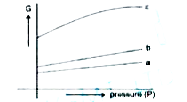One mole of an ideal gas for which CV=3/2R heated at a constant pressure of 1 atm from 250Cto1000C
What will be the amount of work done in the process?Solution in Telugu
−62.32 Cal
−140.925 Cal
−142.27 Cal
−149.025 Cal
The correct Answer is:D
Step by step video, text & image solution for One mole of an ideal gas for which C_(V)= 3//2R heated at a constant pressure of 1 atm from 25^(0)C "to" 100^(0)C What will be the amount of work done in the process? by Chemistry experts to help you in doubts & scoring excellent marks in Class 12 exams.
Topper's Solved these Questions
- BOOK - AAKASH SERIESCHAPTER - CHEMICAL THERMODYNAMICSEXERCISE - Practice Sheet- Exercise-II30videos
CHEMICAL THERMODYNAMICS
- BOOK - AAKASH SERIESCHAPTER - CHEMICAL THERMODYNAMICSEXERCISE - Practice Sheet- Exercise-III30videos
CHEMICAL THERMODYNAMICS
- BOOK - AAKASH SERIESCHAPTER - CHEMICAL THERMODYNAMICSEXERCISE - Lecture Sheet -Exercise-IV16videos
CHEMICAL THERMODYNAMICS
- BOOK - AAKASH SERIESCHAPTER - CHEMICAL KINETICSEXERCISE - Objective Exercise - 4 (Assertion (A) & Reason (R) Type Questions)44videos
CHEMICAL KINETICS
- BOOK - AAKASH SERIESCHAPTER - CHEMISTRY IN EVERY DAY LIFEEXERCISE - PRACTICE EXERCISE29videos
CHEMISTRY IN EVERY DAY LIFE
Similar Questions
Assertion: Under adiabatic free expansion, (dUdV)T is +ve when attractive forces are dominant between gas molecules [U,V,T respresent internal energy, volume and temperature of gas respectively]
Reason: Internal energy is a state function.09:59View SolutionThe following curve represents the variation of Gibbs function 'G' with pressure at constant temperature. Correct match of given plots with the physical state of a substance is
 04:16View Solution
04:16View SolutionFor a reaction R1,ΔG=xKJmol−1. For a reaction R2,ΔG=yKJmol−1. Reaction R1 is non-spontaneous but along with R2 it is spontaneous. This means that
07:05View Solution(A) Spontaneous reaction may be slow or fast.
(R ) Spontaneous nature deals with feasibility of the reaction but not rate.01:52View SolutionAnti allergy drugs are
01:54View SolutionOne mole of an ideal gas is heated at constant pressure from 0∘C to 100∘C.
a. Calculate the work done.
b. If the gas were expanded isothermally and reversibly at 0∘C from 1atm to some othe pressure P, what must be the final pressure if the maixmum work is equal to the work in (a)?04:18View SolutionOne moles of an ideal gas which C_(V) = 3//2 R is heated at a constant pressure of 1 atm from 25^(@)C to 100^(@)C . Calculate DeltaU, DeltaH and the entropy change during the process.
03:05View SolutionOne mole of a monoatomic ideal gas is heated at constant pressure from 25^(@)C to 300^(@)C . Calculate the DeltaH,DeltaU , work done and entropy change during the process. Given C_(v)=3/2R .
02:01View SolutionOne mole of an ideal monoatomic gas is heated at a constant pressure of 1 atmosphere from 0^(@) C to 100^(@0 C. Work done by the gas is
View SolutionThe work done is heating one mole of an ideal gas at constant pressure from 15^(@)C to 25^(@)C is
03:47View SolutionIf one mole of an ideal gas with C_(v) = (3)/(2) R is heated at a constant pressure of 1 atm 25^(@)C to 100^(@)C . Which is correct
01:50View SolutionOne mole of an ideal gas is heated at constant pressure from 0^(@)C to 100^(@)C (A) Calculate work done. (B) If the gas were expanded isothermally and reversibly at 0^(@)C from 1 atm to some other pressure P_(1) , water must be the final pressure if the maximum work is equal to the work involned in (a)?
02:44View SolutionOne mole of an ideal gas is heated from 0^@ C to 100^@ C at a constant pressure of 1 atmosphere. Calculate the work done in the process.
03:15View SolutionOne mole of an ideal gas (C_(v) = 3/2R) is heated at constant pressure of 1 atmosphere from 25^(@) C to 100^(@) C. Calculate DeltaE and DeltaH .
01:19View Solutionयदि स्थिर दाब पर एक मोल आदर्श गैस को 0∘C से 100∘C तक गर्म किया जाता है तब इस प्रक्रम में कार्य होगा (R=8.3J/mole-kelvin)
07:11View Solution

